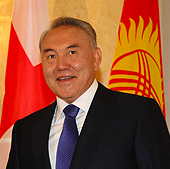On Jan. 15, in polling that the Organization for Security and Cooperation in Europe (OSCE) characterized as not meeting the “fundamental principles of democratic elections,” the ruling Nur Otan party of Kazakhstani President Nursultan Nazarbaev won just more than 80 percent of votes cast and 83 out of 108 seats in Kazakhstan’s lower house of parliament, the Majilis. The OSCE, which had the largest and longest election observation mission in the country, cited the exclusion of opposition parties as well as numerous problems with counting and other violations at some of the polling places they monitored in concluding that the ballot had fallen short of international standards for free and fair elections.
Notwithstanding the shortcomings, recent changes in Kazakhstan’s electoral procedures allowed two additional parties, albeit ones that support the government, to win seats in the Majilis, which was previously wholly filled by representatives of the Nur Otan party.
From Jan. 12 through Jan. 16, I monitored the Kazakhstani ballot first-hand as a member of the International Independent Observer Mission, accredited by the Central Election Commission (CEC) and sponsored by the International Tax and Investment Center, a nonprofit research foundation that focuses on risk assessment in the former Soviet republics and elsewhere. (In the interests of full disclosure, the ITIC receives funding from Kazakhstan state-owned enterprises, as well as corporations doing business in Kazakhstan.)

